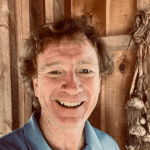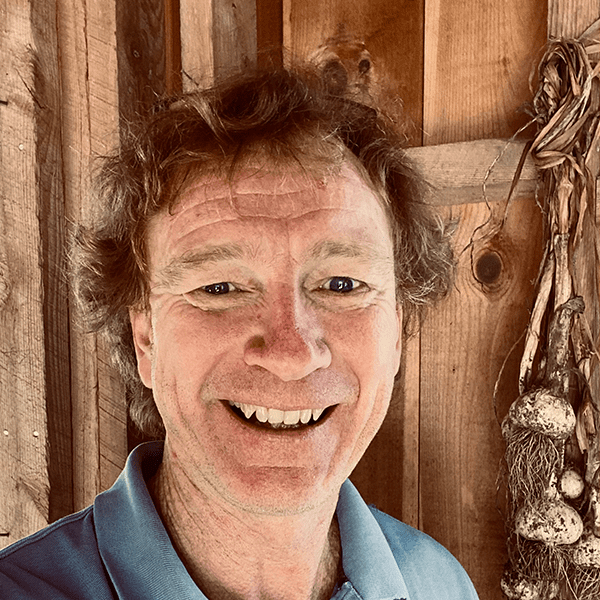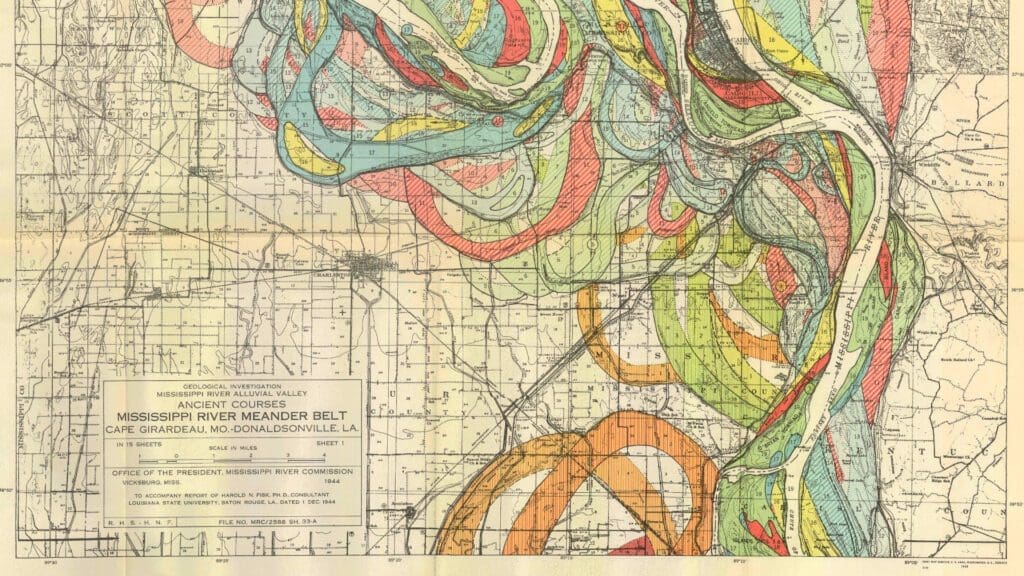W
We had to appear before a judge to complete my legal adoption. I was ten. My mom’s new husband (and my soon-to-be new dad) drove us downtown; my mom sat next to him in the front. At the courthouse, we walked into a windowless room with plastic wood panelling and a drop ceiling with recessed fluorescent lights. Everyone wore stiff clothes.
My birth certificate, rewritten that day, is still on file at the Mahoning County Courthouse in Youngstown, Ohio. It says that my name is Chris Van Meter, born to parents Donald and Suzanne Van Meter.
My birth certificate is a lie.
The lie of my birth certificate is the untruthfulness of denial—my mom’s denial. The aim of that lie was to erase the past. My mom wanted a new start but did not want to submerge herself in the icy waters of the Jordan that burn us clean and make us new. She feared the cost of being made new, so she tried the shortcut of self-creation: she invented a new origin story for herself and for me. The function of the new origin story was to protect herself from the pain of her marriage with my father.
My mom hated my father, but it wasn’t spite that drove us to the courthouse to get “Owen” erased from the record and replaced with “Van Meter.” Shame and grief fuelled that ride downtown. Raging at my dad allowed my mom to avoid the intolerable pain of her past. Her self-righteous anger helped her avoid taking any responsibility for the mess we lived in. The new origin story concealed, for example, her shameful pregnancy, at age eighteen, unmarried and in college; and her shameful affair, as a high school teacher at age twenty-five, with a senior in her English class. The new origin story created an innocent past in which there was no loss and no pain, and there were no victims. My mom was avoiding the reckoning.
I loved my mom, and wanted to help her. I was ten. At ten you don’t know much about life, but you do know that if your mom falls apart, your world falls apart with her. When I found out that she was marrying Don, that we were moving to a new town, and that I was getting a new name, I volunteered to change my middle name too. My middle name is Carl, my dad’s name. I knew the score, even if I didn’t understand the game. I volunteered to become “Christopher Donald Van Meter” rather than “Christopher Carl Owen.”
My mom is not a villain. She was young and doing the best she could. The new Van Meter family was a new home on her terms. The lie of a mythically innocent past helped her survive.
That same lie almost killed me. Both things can be true.
I trained to be a pastoral marriage and family therapist in order to understand what the hell happened to me as a child. Discovering Murray Bowen’s emotional systems theory changed my map of the world. His framework helped me explore the uncharted regions of my upbringing that, until then, had been marked “Here Be Dragons.” The major insight of Bowen’s theory demands that we take the emotional interconnections between family members, rather than individuals, as the fundamental unit of analysis. It’s simple but profound. Focus on how emotions work in family relationships. See the members of a family not in isolation from one another but as components of a larger emotional network.
This lens also helps us see what’s going on in our society. The scale is different, but the human dynamics are the same. The basic human need is belonging. Belonging means being seen, and once seen, being found valuable. If that basic human need is not met, the emotional system becomes awash in the anxiety and shame of unmet needs. People go into survival mode. Put on a flak jacket when this happens, because it means a lot of people are running around in unacknowledged psychic pain who have nothing to lose. Good marriage counsellors, novelists and poets, social workers, and pastors understand this. Most of the lawyers and business people who run for and win political office do not.
The rationalistic, individuals-in-isolation lens that dominates how we think about human difficulty sees people as machines in need of fixing. We so thoroughly assume this is the right way to think that we don’t think about it critically, if we think about it at all. Lies and deceptions, in this view, are like bad gas in a lawn mower that sits all winter. The bad gas gums up the engine. All we need to do is siphon off the bad gas of falsehood and replace it with the pure gas of truth, and the machine will fire on the first pull.
The only problem with this story is that it’s wrong. It doesn’t account for how lies function at the emotional level. The only thing missing is real human beings struggling to find our way.
No one will admit to approving lies, but actions speak louder than words. “Human kind cannot bear very much reality,” T.S. Eliot says in Four Quartets. Duplicitous characters in literature feel authentic to us because we recognize ourselves in them. Tolstoy’s Ivan Ilyich, for example, has lived his entire life as though he were a thing, not a person; through the kiss of his son, he realizes the truth of his being and becomes free to go home to the light. In A Few Good Men, Jack Nicholson delivers one of the most quoted movie lines ever: “You can’t handle the truth!” Why couldn’t Tom Cruise’s character handle the truth? For the same reason my mother couldn’t handle the truth. Truth costs you your innocence. Truth forces you to give up the lies that soothe your troubled conscience, the self-deceptions that ease your troubled mind.
Truth forces you to give up the lies that soothe your troubled conscience, the self-deceptions that ease your troubled mind.
Becoming aware of the ways we live in denial is hard. First, the emotional system around us may be deeply invested in the emotional equilibrium—the false harmony, the fake smiles—that denial serves. Second, we ourselves may be similarly invested. Even when we are spurred to grow in awareness and maturity, our denial is invisible to us—and that’s the point. If it were easy for us to see the ways we live in denial, it wouldn’t be denial.
Whether in the halls of Congress or around the Thanksgiving table, it’s crucial to look through the lens of our emotional connections with others to see how lies function. It’s not about facts, reason, and rationality. It’s about grief, shame, and anxiety. It’s about our need to belong. The family secret, the perfect child, the appeaser, the alcoholic, the workaholic, the abuser, chronic conflict, scapegoating, demonizing, over-functioning, avoiding confrontation, cutting off communication with your crazy uncle: all of these (false) ways of being in relationship are not themselves the problem; rather, they are symptoms of an interconnected emotional system lacking honesty. We participate in these dysfunctional patterns to let off steam from the emotional boiler of our relationships. We fear that naming the truth will increase the pressure and cause the boiler to explode.
We say we want the truth, but the deeper desire is belonging. We will do almost anything to fill that desire. Because our most powerful emotions are connected to the people closest to us, and because those powerful emotions can feel overwhelming or intolerable or both, it’s no surprise that it’s in our close relationships, within our families, that emotional dishonesty runs the deepest.
Lies and deceptions create emotional dissonance. We question the solidity of our connections: Can I trust what’s happening in this relationship? Can I trust the ground that this house is built on?
Home is the place where we belong. Home is the place where we see others with compassion and allow ourselves to be seen in our vulnerability. To see, and to be seen, requires trust. You cannot build a home on shifting sand.
James Baldwin, in The Fire Next Time, sees the lies that prevent America from being a home for all.
His writing on race begins with human complexity and stays there. I love this about Baldwin. His heart is broken open so wide that he can hold both our terrible ugliness and our awesome beauty. He resists the temptation of systematizing his insights into an ideology. Ideology is always tempting because it substitutes safe answers and easy formulas for lived tensions. Ideology, in its claim of making a closed system out of reality, forecloses the potential inbreaking of new ways of being. For that reason, ideology is not radical enough. It conceals more than it reveals. Baldwin will have none of it.
Baldwin thinks and writes with a Christian accent. Not doctrinally Christian, but as though his sensibility and conceptual field are so saturated in Christian anthropology that his sentences are infused with something less like theology and more like grace. The costly grace that comes in the baptism of fire, which burns us clean and makes us new.
“Love takes off the masks that we fear we cannot live without and know we cannot live within.” That’s it. Baldwin is writing about race, but look at the pronoun: “we.” He’s getting under our skins and seeing into our hearts. What does he see? He sees sin—and the possibility of salvation. He sees exile—and the possibility of homecoming. For what is sin but separation, and what is a mask but a way to separate, and what is love if not our redemption?
Baldwin defines love in the next sentence. He means it “in the tough and universal sense of quest and daring and growth,” and calls it a state of grace. Why grace? Maybe he calls it a state of grace because quest and daring and growth don’t happen if you’re self-satisfied, if you’re superior, if you’ve “made it,” if you’re, in that way, “white.” Or put positively, if I am willing to dare and willing to grow, I am confessing the brokenness of my past and the lie of its mythical innocence. I acknowledge my lack, my need. I acknowledge that I am incomplete. And not only am I incomplete, but even more: I am never to be completed on my own. The way of love is a state of grace because it’s an acknowledgement that I need you.
The home we seek is behind the mask. One must be gentle with people who wear masks, which means you, which means me. We wear masks the way my father drank tequila. It’s a defence against being seen. If we’re seen we’re vulnerable, and we don’t want to feel exposed. We know in secret where we are ugly. We fear rejection. Better for me to be in control, better for me to conceal myself from the eyes of another, better for me to set myself apart and above and aloof, all to avoid the potential pain of humiliation.
One must be gentle. When it is time to cut with the scalpel of truth, make the incision clean and sure, with compassion, intending to heal. It’s surgery, not warfare. We’re all wearing masks.
The boy becoming a man asks, “Who am I?” On top of the usual confusion of adolescence, I didn’t know who I looked like. I wanted to look like my father, but I couldn’t know. He was gone.
People who knew my last name but nothing else would say, “Oh, you look like your dad.” Meaning my stepdad. The double way that this was not true relationally and could not possibly be true biologically made me feel dangerously light and untethered. I wanted to apologize, but I didn’t know what for.
Painful also was the family portrait at the Olan Mills studio. We posed and smiled; I felt overexposed, as if the camera could see how hard I was pretending. Later, my mom put the picture in a frame, and then she put the framed picture on the fireplace mantle. The Van Meter family. From the picture on the mantle we all looked out into the world, smiling. I was playing the role of Chris Van Meter. I played it for twenty years, but I couldn’t continue to wear that mask and find my way home.
Hiding is a hard-wired shame response. Think of Adam and Eve in the garden after they’ve eaten the apple. When they hear YHWH walking in the garden, they hide from him. They are ashamed of their nakedness. Baldwin again: “A vast amount of the energy that goes into what we call the Negro problem is produced by the white man’s profound desire . . . not to be seen as he is.” The topic is race, but the subject is shame. The shameful parts of our history do not make us a bad country, any more than the shameful parts of my mom’s past made her a bad person. Paradoxically, it’s in our denial of shame that we give it the power to define us. When we create a mythically innocent origin story in which there are no victims, shame is driving the story. It’s just not named. It remains invisible.
The shameful parts of our history do not make us a bad country, any more than the shameful parts of my mom’s past made her a bad person. Paradoxically, it’s in our denial of shame that we give it the power to define us.
In Eddie Glaude’s great book on Baldwin, Begin Again, Glaude quotes Ralph Ellison: “The way home we seek, is man’s being at home in the world, which is called love, and which we term democracy.” Ellison’s impressionistic sentence, delivered in a short speech upon receiving the National Book Award for Invisible Man in 1953, tells us a few things. Democracy is not, in the first place, a procedure. The procedures and structures of democracy—voting, say, or the separation of powers—depend on a democratic aspiration, a vision of the good. This moral vision underwrites the procedures and structures. It’s the blood to the bones. But the content of this moral vision, Ellison tells us, is a vision of love. And this love is itself a different way of seeing: You are not invisible. You are my brother. As brothers, we stand as equals in need of the grace of our Father. No one is innocent. We all come at a cost.
Why is this so difficult? Sometimes home is right in front of us, but we refuse to go in.
Consider the parable of the prodigal son. The story is familiar, but I am particularly indebted to Henri Nouwen’s meditations on the older brother in his book The Return of the Prodigal Son. The younger brother returns, having squandered his inheritance, and begs forgiveness. His father extends forgiveness and welcomes his younger son home. In celebration, he kills the fatted calf for a joyful banquet with the finest food. The older brother, hearing the party from outside, asks what’s happening. When he learns that his father has killed the fatted calf for his disgraceful younger brother, he responds, “Lo, these many years I have served you, and I never disobeyed your command; yet you never gave me a young goat, that I might make merry with my friends. But when this son of yours came, who has devoured your living with harlots, you killed for him the fatted calf!”
“I never disobeyed your command.” Even if we take the older brother at his word and accept that his self-assessment is narrowly correct, the larger claim he is making is false. He wants to be found faultless, thereby earning his father’s approval. The father responds with a different logic, the logic of grace. “My son,” he says, “you are always with me, and everything I have is yours.” In other words, forget the stinking goat. Quit trying to earn my love. Quit trying to be perfect. You are already loved, already accepted. You belong. I claim you as my own. Come into the party.
The older brother has lived in his father’s house all this time, but he has yet to come home. He believes that being above reproach puts him beyond the need for grace. The older brother uses his moral rectitude as a way to deny his need to receive anything—anything—from outside himself. It’s as though he’s saying, “I have caused no one any pain, any heartache, any grief. My life comes at no cost to anyone. I owe no one, and no one owes me. I am self-contained, above reproach. Find me faultless.”
Even if he is not lying, the truth is not in him. The older brother is living in a self-created mythical innocence. The mask of rectitude conceals the reality of his indebtedness. The grace that the older brother needs is the grace of knowing that he is in need of grace. Until that coin goes down the slot, he’s outside the party.
We are all indebted. We all exist at a cost. No one has life on their own. That we must eat in order to live is the most obvious way to see that we exist at a cost. We miss this because most of us live at a distance from our food. It comes on trucks, in boxes and packages, and we don’t think any more about it. Therefore, it’s easy to forget that we have life only through the death of other life. If we eat bacon, we are indebted to the pig. If we eat a carrot, we are indebted to the soil, the rain, the sun, and the labour (if it wasn’t our own) that sows, hoes, and reaps. My daughter, age eleven, wept when we sat at the table and sang our family blessing, before eating the grilled hamburgers that came from the bull calf we had raised and just received back from the slaughterhouse. Her tears were truth. We exist at a cost.
Saying grace before a meal acknowledges our indebtedness. We have life only by what we receive as gift. The older brother wants to avoid this truth. His avoidance keeps him from coming home to inhabit his fallen human life and celebrating that fallenness as itself a gift. The fallenness is a gift because it connects us to each other and to the earth. We exist in interlaced indebtedness.
James Baldwin says this: “The white man is himself in sore need of new standards, which will release him from his confusion and place him once again in fruitful communion with the depths of his own being.” Placing this sentence next to the parable of the prodigal son allows us to hear overtones. The “new standard” that the older brother (white man) needs is the father’s logic of grace. The white man’s (older brother’s) “confusion” is thinking that grace is for someone other than himself. The “fruitful communion with the depths of his own being” is recognizing that he is not above being indebted—that, in fact, he exists only by what he has received from others. This recognition of our indebtedness is the condition for living as brothers in the truth of the equality that is grounded in our mortal being: that all of us who eat now will eventually be food for worms. Nothing is more equal than that.
Baldwin names the lies that keep America from being a home for all. It doesn’t have to be about race. He casts his net deeply enough to catch all kinds of bottom-dwelling human self-deceptions that keep us strangers to ourselves and to each other.
Sin. It’s a great word. You can act morally perfectly and still be a sinner, locked out of the house. Don’t protest. Let the waters of grace wash you clean and make you new. Put the key that you’ve been given into the lock and turn it. The door will swing inward, into music and laughter, into the warmth and smell of dancing bodies and a fire and wine, where a table is set in silver and all are welcome to the feast. You are home.
Innocence Unmasked
The time came to take my name back. Many tears of reckoning, at last, with my grief and pain led to this moment. The truth of my name was the truth of the past, and the truth of the past was the key to the home I hoped one day to make with a wife and children. God willing.
I expected anger from my mother, but I did not anticipate how furiously she would defend the mythically innocent origin story she had created. My dad was the enemy; to take back the name of Owen was a declaration of war. More than twenty years had passed since their divorce, but my mom’s emotional energy hadn’t dissipated. If anything, the heat of her unprocessed pain and anger had forged missiles and rockets, which she now launched at me over the phone. It was the hardest conversation I hope I will ever have. The biggest bomb came toward the end, when she enlisted into her cause the support of the man I loved the most, from beyond the grave. “Your grandfather,” she said, “would be so disappointed. He couldn’t stand Carl.”
The certificate of change of name was issued by the court of probate in Hillsborough County in the state of New Hampshire. Relying on the birth certificate from Ohio, it perpetuates the lie that my parents are Don and Suzanne. That’s okay. It also decrees (seriously, it says “decree”) that my name is Christopher Carl Owen. That is true.
My friends and I gathered on a hillside for a ceremony to mark my reclamation of the name I was baptized into. My future wife gave me a homemade certificate with these lines from Eliot’s Four Quartets:
We shall not cease from exploration
And the end of all our exploring
Will be to arrive where we started
And know the place for the first time.
Truth is not home, but truth makes home possible.
The coming of grandchildren softened my mom. I wouldn’t call our relationship reconciled. It was more like a ceasefire, or maybe even a truce.
Sixteen months before the morning she fell dead of a heart attack, my mom was visiting us in New Hampshire. I decided to give her news about my father Carl. He had become my responsibility. She knew the outline of his story: he had never remarried; he lived alone in Mexico; he had some fake friends, his drinking buddies, one of whom had grifted him out of some money.
I was nervous about how my mother might respond to news about my dad. Bitter silence was possible. Contemptuous judgment was possible. Angry tears were possible. I was prepared for all kinds of responses from my mother, except for the one she gave.
Truth is not home, but truth makes home possible.
I breathed. I said, “Carl’s drinking himself to death. He doesn’t eat any food; he just drinks tequila. He can’t get out of bed. I can’t believe he’s lived as long as he has, without eating. I can’t imagine he’ll be alive much longer.”
I stopped breathing and waited.
“What a waste.” My mom said these words without anger or shame, without contempt or disgust. Her voice was calm, with just a hint of the complex flavour of sadness that, with age, begins to taste like wisdom.
“What a waste.” My mom was telling the truth about my dad. She was admitting to herself and to me what both of us had known all along, but could not name for fear of the cost: my dad was a richly creative, dexterous, gifted, and lovable man.
She saw his worth. Otherwise, his demise would be no waste at all.
I know what it means to live in a lie that someone else created. A sanitized history may ease a guilty conscience, but someone pays a price for the lie, whether in our families or in our nation. Lies are not free; only grace is free. The made-up story of a mythically innocent past hides the cost. Everyone is suffering, but when the emotional system is invested in the lie, some people carry the suffering at compound interest, and some people are under the illusion that suffering is somehow only for other people. Because the emotional system is invested in the lie, to name the truth is to invite retaliation. People’s sense of belonging—one of our deepest human needs—feels threatened.
One big lie is that the only way we can find belonging is by dehumanizing some other. The lie grows when we don’t—or can’t—see that we’re doing this. So we tell another lie: We’re good people. We’d never hurt anyone. Or: They deserve it. Any lie will suffice, as long as it protects our innocence.
The way home is the way down, down into the truth of our lives, down into our pain and brokenness, down into the ways that we exist at a cost.
We ascend by descending, and grace is the descending movement. I am paraphrasing Simone Weil. What she means isn’t exactly clear, but it’s a hint. The way home is the way down, down into the truth of our lives, down into our pain and brokenness, down into the ways that we exist at a cost. We have to go down there to hear Jesus calling us by name. We have to go down there to find each other.
Ralph Ellison connects home to love and democracy; James Baldwin directs us downward to make the connection true. Come down “from the heights of [your] lonely power,” he tells the white man, meaning sinners, meaning us, and “become a part of that suffering and dancing country” where we see each other with compassion and allow ourselves to be seen in our vulnerability. A family, like a democracy, is an achievement that is always in the making. Are we brave enough to receive the costly grace that leads us down to each other?






